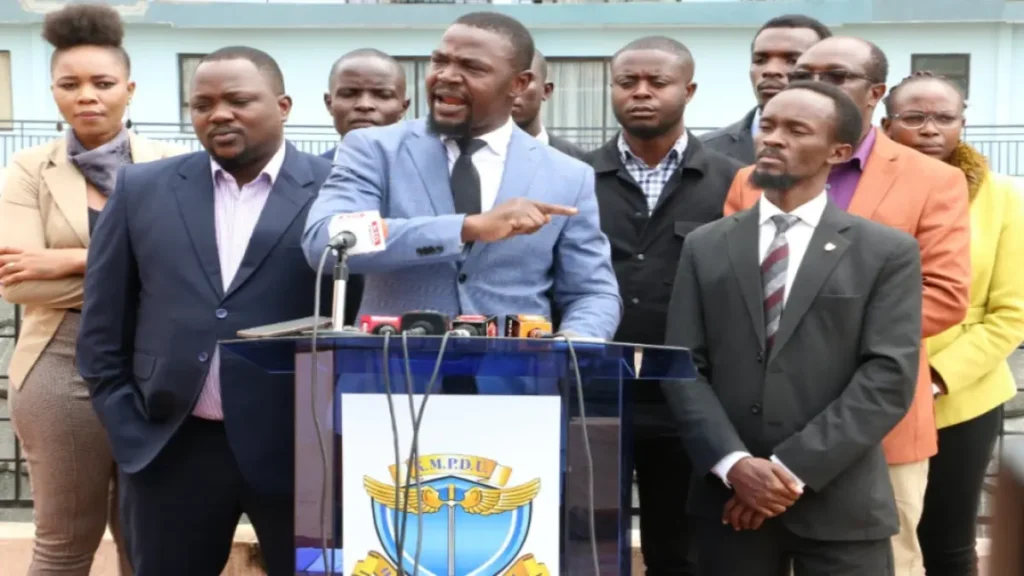Medical interns across Kenya have been directed to withdraw their services following months of unpaid salaries, with the situation reaching a critical point after multiple suicide incidents among young doctors.
The Kenya Medical Practitioners, Pharmacists and Dentists Union (KMPDU) took decisive action after two intern doctors died by suicide. Additionally, five others attempted to take their lives due to financial hardship.

KMPDU Secretary General Dr. Davji Atellah, flanked by other union members and officials, addresses the press on November 27, 2024. PHOTO | COURTESY
Dr. Davji Atellah, KMPDU Secretary General, issued the stay-at-home order to protect the mental health and wellbeing of intern doctors. The government has failed to honor its payment obligations for seven months.
“We cannot stand by while our young doctors suffer in silence,” stated Dr. Atellah. “The government’s neglect has led to unimaginable consequences.”
The crisis emerged despite previous agreements with the government. Earlier this year, medical interns had gone on strike over the same issue of delayed payments.
Furthermore, the union has threatened a nationwide strike if the situation remains unresolved. They have issued a 14-day strike notice to press their demands.
The impact of this crisis extends beyond the affected interns. Many hospitals, especially in rural areas, rely heavily on intern doctors to provide essential healthcare services.
“Patient care is severely compromised when our interns cannot work,” explained Dr. Atellah. “Many cannot even afford transport to their workplaces.”
The financial strain has forced many interns to take loans to cover basic needs. Some have accumulated significant debts while waiting for their promised salaries.
The KMPDU leadership has highlighted the broader implications of this crisis. They warn that the situation could deter future medical professionals from joining the profession.
“How can we encourage young people to pursue medicine when they see their colleagues suffering?” questioned Dr. Atellah. “This crisis threatens the future of healthcare in Kenya.”
The union’s demands include immediate payment of all pending salaries. They also seek assurance of regular, timely payments moving forward.
Hospital administrators across the country have expressed concern about the situation. The withdrawal of intern doctors has strained their ability to provide adequate healthcare services.
The crisis has sparked debate about the broader issues facing Kenya’s healthcare system. Critics point to chronic underfunding and poor working conditions for medical professionals.
Mental health experts have also weighed in on the situation. They emphasize the need for better support systems for healthcare workers under stress.
The government’s response to the crisis remains unclear. Previous promises to resolve the payment issues have not materialized.
Meanwhile, the KMPDU continues to advocate for its members. They insist that the stay-at-home order will remain until all dues are cleared.
The union has also called for establishing better mechanisms to prevent such crises. They propose regular dialogue between healthcare workers and government officials.
Patient advocacy groups have expressed solidarity with the intern doctors. They acknowledge that tired, stressed, and financially strained doctors cannot provide optimal care.
As the 14-day strike notice period progresses, stakeholders watch closely. The resolution of this crisis could set important precedents for healthcare worker welfare in Kenya.
The KMPDU leadership maintains that their actions aim to protect both doctors and patients. They argue that addressing these issues is crucial for Kenya’s healthcare system.



















